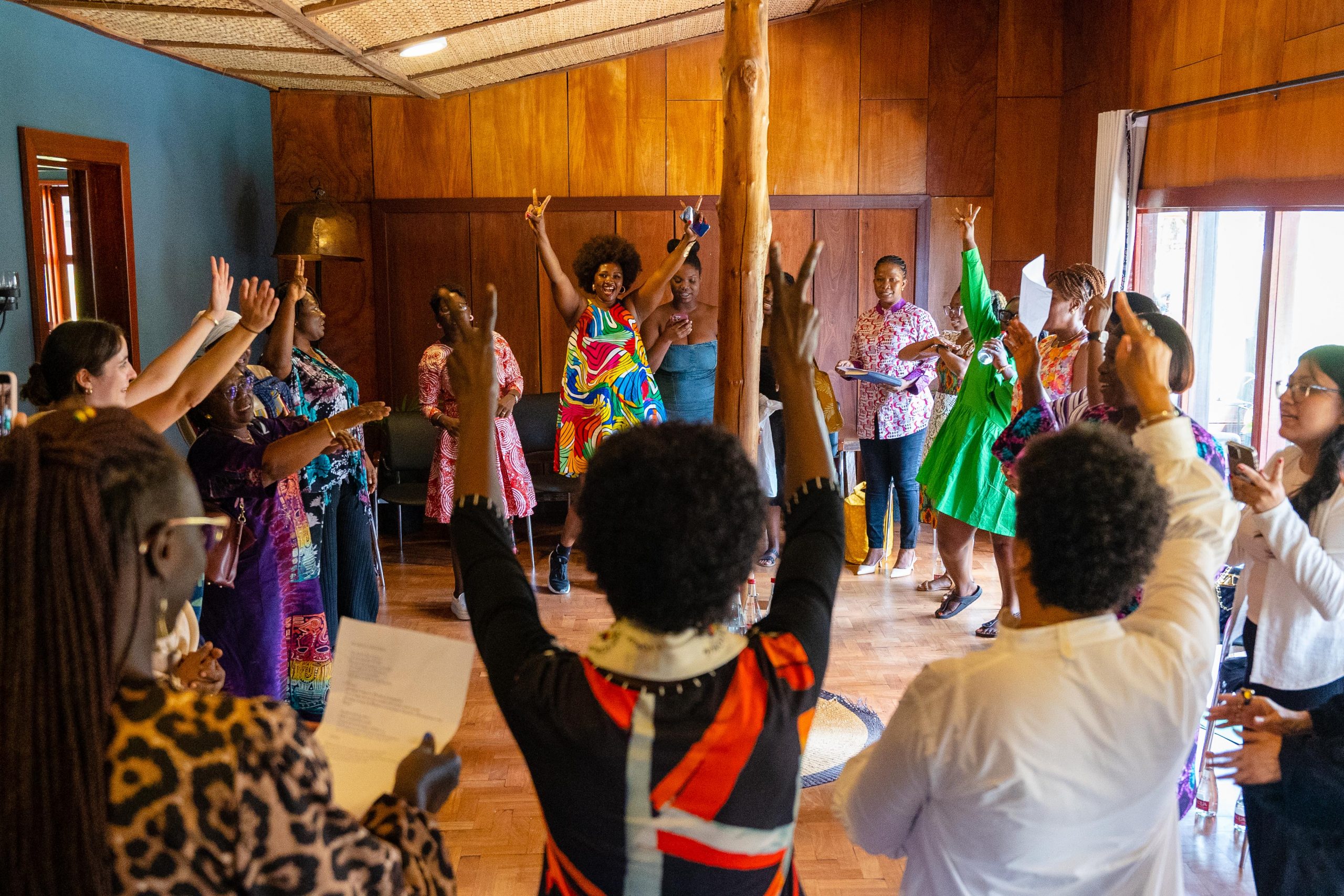
The workshop group closes a session of the Global Forum by singing the African Women’s Anthem.
Photo Credit: Illuminous Photography
Across Africa, activists fighting for gender justice have used emotions as a powerful driving force behind mobilization efforts, shaping both the inception of movements and their ongoing momentum. Social movements often emerge from deep emotional experiences — anger, frustration, pain, sorrow, loss — and continue to thrive by harnessing these emotions. Passion and dedication grow from these sentiments, fueling a long-term commitment to social change. Emotions not only ignite activism but also sustain it, providing the resilience necessary to navigate the challenges of social justice work.
From November 1-3, 2024, the Institute on Gender, Law, and Transformative Peace hosted a transnational workshop titled “Elections Campaigns as Collective Care: A Global Forum.” The event brought together women activists, movement leaders, academics, and policymakers from across the African continent. Participants brought a diverse range of expertise, including human rights, peacebuilding, freedom of information, free speech, women’s political participation, gender-based violence, legal policy, and youth organizing. The workshop was comprised of participants from Nigeria, Liberia, Sierra Leone, Ghana, South Sudan, and Kenya, as well as regional facilitators from Uganda, South Africa, and Kenya.
As a student fellow documenting the workshop, I gained profound insight into the role of emotion in social movements. Listening to the participants, I saw firsthand how they have placed emotions at the heart of their movement-building efforts, developing strategies that recognize and engage with the power of emotional experiences in their political activities. Understanding how these activists have built in emotional engagement in their work, or used emotions as resources for their organizing, is a productive entryway to deeper insights about related aspects of their activism, such as strategies for mobilization and sustainability. Gender justice movement-building, in particular, involves understanding, mobilizing, and directing emotions toward specific goals, while encouraging cross-movement solidarity across different communities.
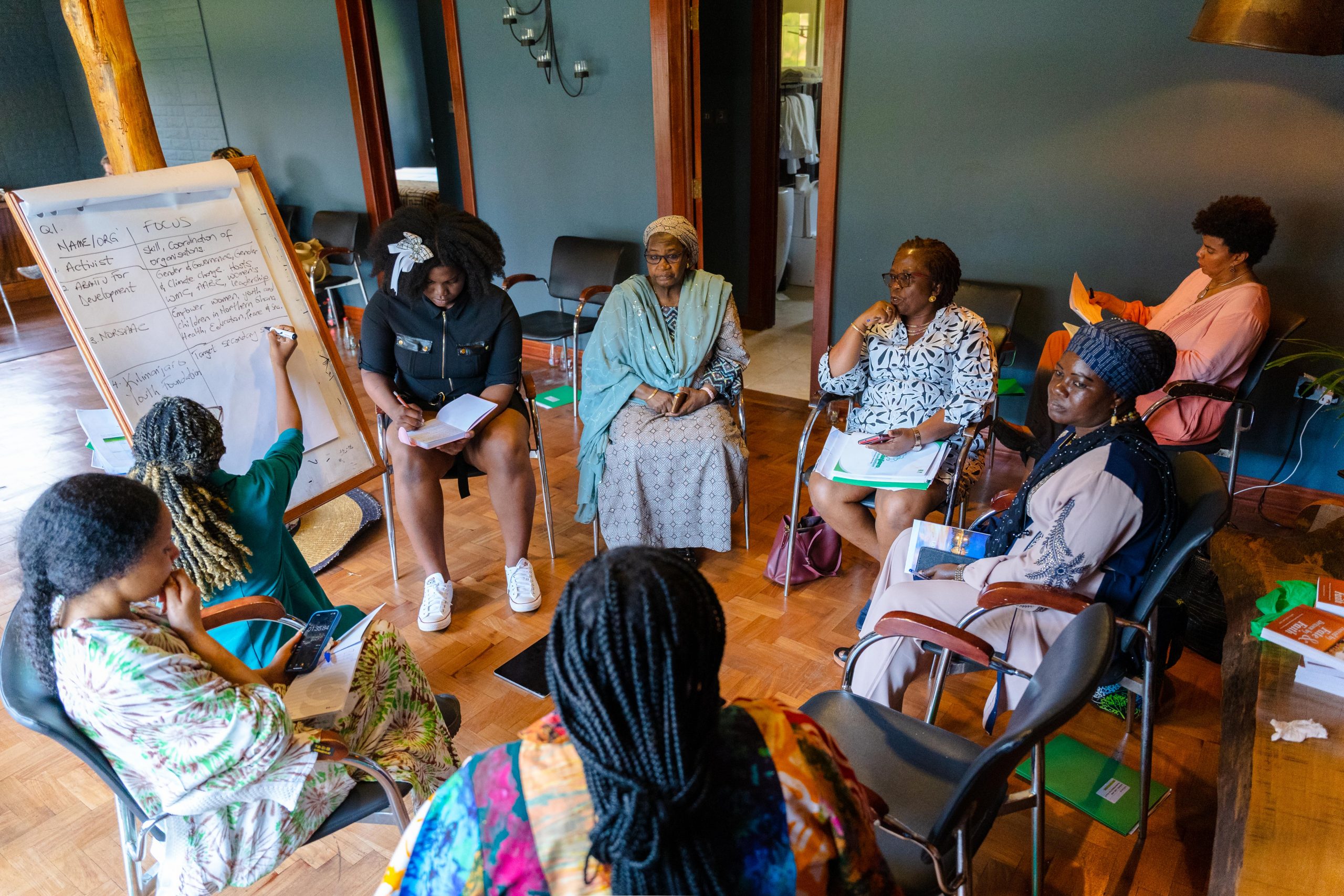
The participants from Ghana and Nigeria meet for a break-out session during the Global Forum workshop: Ms. Grace Ampomaa Afrifa, ABANTU for Development; Ms. Becky Enyonam Ahadzi, Affirmative Action Bill Coalition – Ghana; Ms. Melody Darkey, Women in Law and Development in Africa); and Ms. Hafsah Sey Sumani, NORSAAC. The participants from Nigeria included: Ms. Ayodeji Evelyn Fadugba, Kilimanjaro Youth Foundation; Ms. Saudatu Mahdi, Women’s Rights Advancement and Protection Alternative; and Ms. Fakhrriyyah Hashim, North Normal. Institute Fellow Francesca Phanius took notes for this breakout session.
Photo credit: Illuminous Photography
Regional Traditions of Emotion as a Strategy for Long-Term Activism
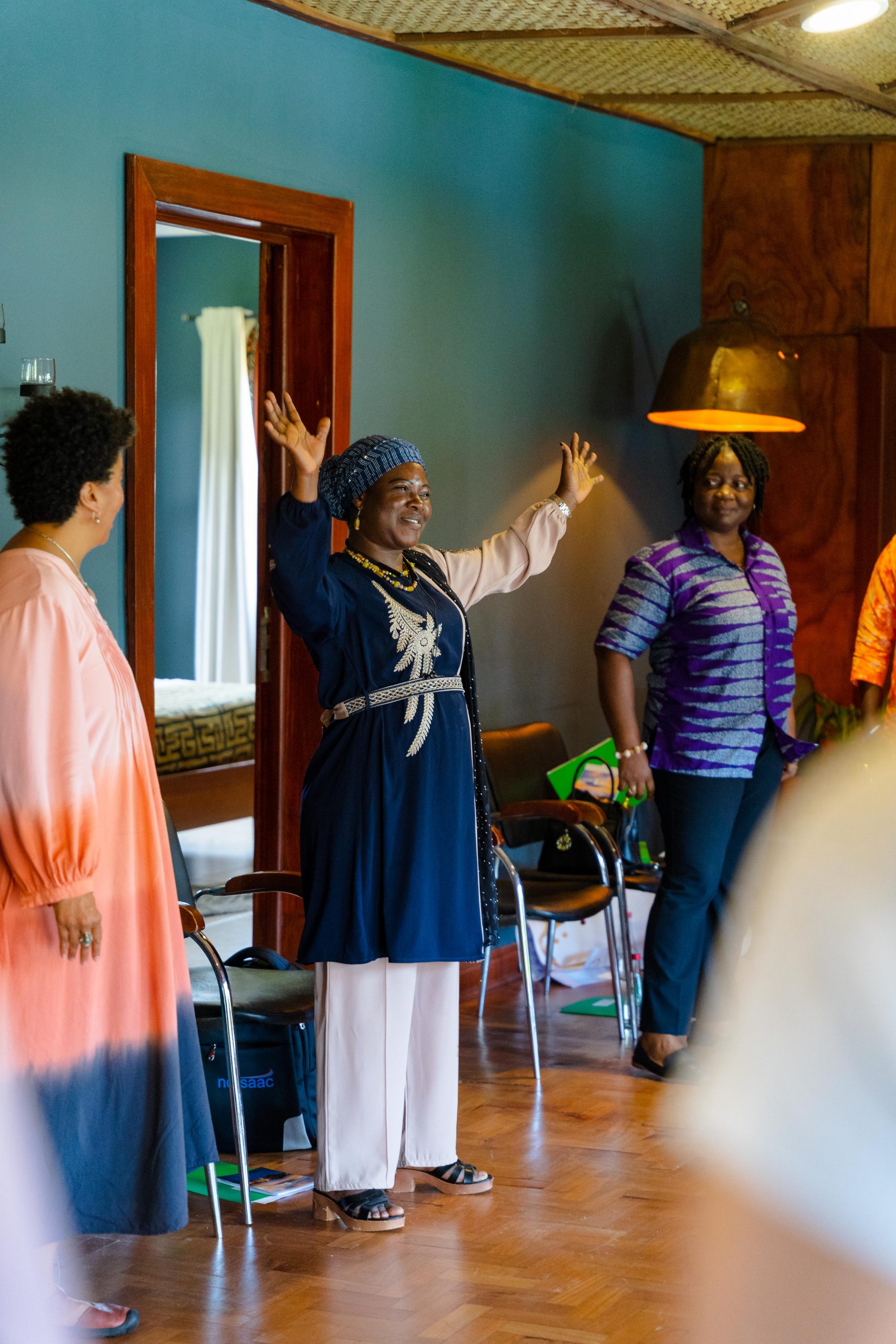
Ms. Hafsah Sey Sumani a workshop participant, is an advocate for women, girls, and youth empowerment. She works as the Head of Programs, Policy & Influencing at NORSAAC, a community-based human rights organization based in Ghana.
Photo credit: Illuminous Photography
The work of campaigning, organizing, and community building — tasks that demand grit, dedication, and passion — is often tedious and emotionally taxing. Activism is deeply intertwined with anger, frustration, and sadness. It is heavy by nature, and the women I met in Ghana were no exception; each of them sacrificed tirelessly to achieve tangible results. However, my time at the Global Forum allowed me to see activism in a new light. While I had always recognized the emotional weight of activism, I observed — perhaps for the first time — how joy and other positive emotions also have a place in social movements, even if they are not at its forefront. I noticed how the energy in the workshop’s room shifted when a joke was shared, despite the difficult conversations we had just engaged in about the struggles of activism. It became clear that while joy is not the defining element of activism, it is still a vital component. Joy does not overshadow the hardships of activism, but it serves as a necessary counterbalance, offering moments of relief, connection, and renewal along the journey.
The Forum’s design and regional facilitation drew on longstanding mobilization strategies that women have used across the continent to incorporate emotions, such as joy through music, within their activism. Each session began with activities designed to set the tone for the work, and established a sense of unity. The African Women’s Anthem was sung before and after every activity and discussion, creating an immediate sense of solidarity and shared purpose. Facilitators lightened the mood when necessary, ensuring that even the heaviest discussions had moments of levity. These seemingly small practices had a profound impact: laughter, smiles, and movement became integral parts of the activist experience. These exercises strengthened bonds within the group, reinforcing a sense of community and shared resilience. Historically marginalized communities have long created their own spaces of joy as acts of resistance and survival. Whether through art, dance, storytelling, or humor, joy has always been an essential tool for retaining committed participants in movements. Indeed, sustaining activists over the long term requires intentional emotional care.
Harnessing Anger for Political Action
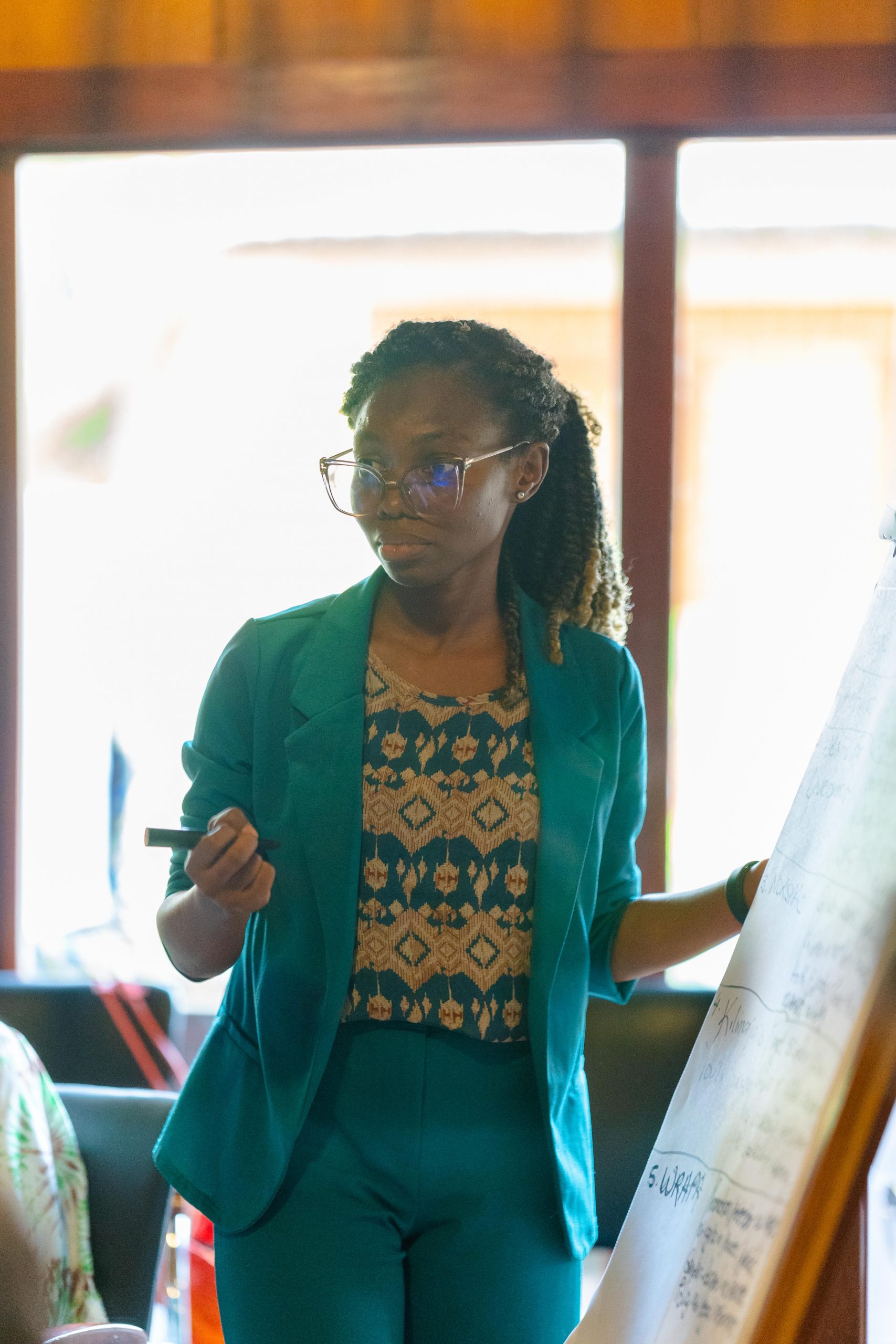
Ms. Becky Enyonam Ahadzi, a workshop participant, is a lawyer and an expert in women’s and children’s rights. She works as a part of the Affirmative Action Gender Equality Bill Coalition in Ghana, which mandates women’s representation in government.
Photo credit: Illuminous Photography
While joy can sustain movements, anger often fuels them. Many workshop participants spoke about how anger is a powerful mobilizing force, particularly for young activists. Ms. Ayodeji Evelyn Fadugba, a Nigerian activist and director of the Kilimanjaro Youth Foundation, an organization dedicated to empowering young people and advancing human rights, promoting peace, and safeguarding free speech, contributed with an important example from her own work. Ms. Fadugba described how many young Nigerians feel politically underrepresented or overlooked — a sentiment that often fuels deep anger. “Looking at youth anger — how can you channel it? How can this be purposeful? How can you relate it to citizenship, leadership, and participation? It is okay to be angry, but the anger has to be channeled. You have to develop advocacy skills to be able to express yourself beyond the anger.” Ms. Fadugba’s work focuses on transforming anger into action, particularly through voter registration initiatives in schools. She emphasized that at its core, anger signifies a desire for change — it stems from pain, frustration, and a belief in the right to a better future. However, anger alone is not enough; it must be directed into constructive, strategic efforts that create lasting impact. By harnessing and sustaining emotional energy, movements can achieve longevity and drive meaningful progress.
Addressing Emotional Tensions Within Movements

Ms. Grace Ampomaa Afrifa, a workshop participant, is Head of Programmes at ABANTU for Development in Ghana. She designs, manages, and oversees the delivery of gender-sensitive research and policy analysis program.
Photo Credit: Illuminous Photography
While emotions can unify and sustain activism, they can also create tensions within movements — and addressing these tensions openly can help repair potential divisions within activist spaces. During the workshop, many of the participants highlighted that intergenerational conflicts can be a significant challenge for movement building – a concern that resonates with many other activist groups and spaces around the world. In these conversations, younger activists expressed feeling dismissed or unheard, while older activists voiced concerns about the impact of “cancel culture.” Ms. Saudatu Mahdi, a veteran women’s rights activist of the Women’s Rights Advancement and Protection Alternative (WRAPA) has had a decades-long career as a women’s rights activist in Nigeria, emphasized the importance of fostering respect across generations. “I want to create a bond that enables Gen Zs to respect where I’m coming from in terms of knowledge, experience, and privilege. And [for them to] be able to also say, ‘If I came at mama’s time….’ So we need to find those case to interface with them, respect them for what they are, but also tell them respectfully what they need to do. This openness is very, very important. It’s very important.”
Following the forum, many participants agreed that acknowledging and validating each other’s emotions was essential for bridging generational divides. Ms. Fakhrriyyah Hashim, a participant who works on development policy and communications as an advocate on sexual and gender-based violence at North Normal in Nigeria, reflected, “I found the intergenerational dialogue… a useful and practical platform to discuss some underlying perception issues that act as a barrier to dialogue.” She discussed the importance of openly communicating about these barriers, such as “the age effect, which suggests people become more conservative as they grow older with political beliefs often reflecting this shift. The burden of socioeconomic responsibilities that cause this shift is often absent in young radicals that push the bounds of societal limitations on discourse deemed beneficial to collective progress.”
This discussion highlighted that addressing emotional tensions within activism can strengthen dialogue, build community, and create more sustainable movements. Ms. Hashim said the experience reminded the group “to interrogate why we challenge each other’s ideas and ensure the underlying motivator remains the collective goals of our advocacy.”
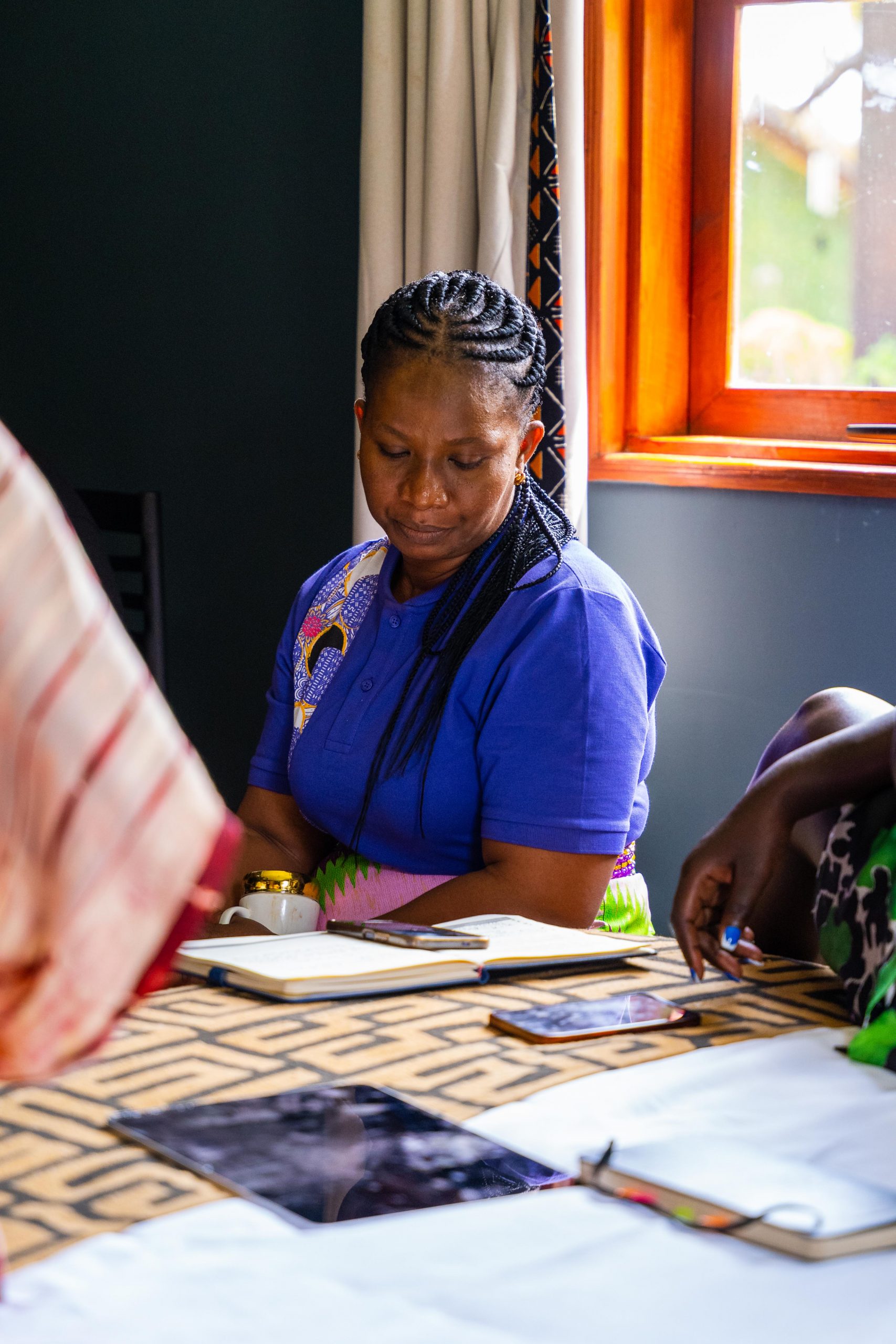
Ms. Melody Darkey, a workshop participant, is Program Officer at WiLDAF Ghana, where she works on promoting and strengthening strategies which link law and development to increase women’s participation and influence at the community, national and international levels.
Photo credit: Illuminous Photography
Emotion as a Catalyst for Long-Term Change
The Global Forum demonstrated that emotions serve as strategic resources that fuel mobilization efforts, sustain long-term engagement, and foster unity. Whether through anger driving action, joy preventing burnout, or emotional recognition bridging divides, movements are built on a foundation of deep emotional energy. To sustain activism, it is crucial to acknowledge and integrate these emotions into organizing efforts. Movements must not only fight for justice but also create spaces for healing, resilience, and connection. The success of activism does not rest solely on policies and strategies, but also on the emotional strength of those who lead the fight. By intentionally incorporating joy, anger, as well as emotional recognition and validation, activists can build movements that are not only effective but also enduring — capable of sustaining engagement and inspiring future generations to continue the fight for justice.
Francesca Phanius was a Student Fellow at the Institute on Gender, Law, and Transformative Peace in Fall 2024. Francesca will graduate from Brooklyn College in 2025 with a BA in Political Science. She attended the Institute’s Global Forum in Ghana in November 2024.

